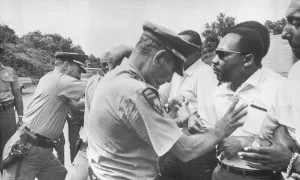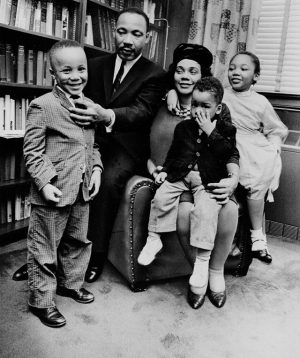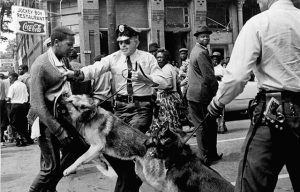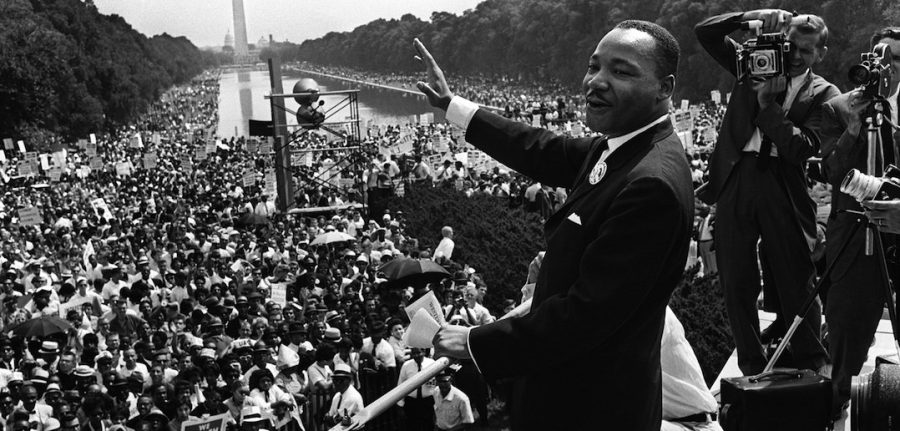Honoring the legacy of Rev. Dr. Martin Luther King Jr.
The civil rights leader Martin Luther KIng (C) waves to supporters 28 August 1963 on the Mall in Washington DC (Washington Monument in background) during the “March on Washington”. King said the march was “the greatest demonstration of freedom in the history of the United States.” Martin Luther King was assassinated on 04 April 1968 in Memphis, Tennessee. James Earl Ray confessed to shooting King and was sentenced to 99 years in prison. King’s killing sent shock waves through American society at the time, and is still regarded as a landmark event in recent US history. AFP PHOTO (Photo credit should read -/AFP/Getty Images)
January 19, 2022
On Jan. 17, people across the nation honored the life of Rev. Dr. Martin Luther King Jr. and his prolific work in the Civil Rights movement. The day of remembrance falls on the third Monday in January every year.
King Jr. was born on Jan. 15, 1929 in Atlanta, Georgia. His father, Martin Luther King Sr., became pastor of the Ebenezer Baptist Church, and his mother, Alberta Williams King, was the daughter of the former pastor and taught King Jr. about segregation and the Civil War.

In 1944, King Jr. enrolled at Morehouse College when he was a mere 15 years old. He later enrolled at Crozer Theological Seminary in Pennsylvania and graduated with a Bachelor of Divinity in 1951. King Jr. became a pastor of the Dexter Avenue Baptist Church in Montgomery, Alabama in 1954, and received a doctorate in systematic theology from Boston University in 1955.
Later that year, the Montgomery bus boycott called Jim Crow laws into question when Claudette Colvin refused to give up her bus seat to a white man. The movement later famously made Rosa Parks the face of the boycott because Colvin was a minor.
King Jr. was chosen to be the leader of the bus boycott, which led to his arrest and targeted attacks on his house. The boycott lasted 365 days until the Supreme Court case Browder vs. Gayle ruled that racial segregation on Montgomery buses was unconstituitonal.
In 1963, King wrote an influential letter from his jail cell entitled “Letter from Birmingham Jail.” In his letter, he said, “Injustice anywhere is a threat to justice everywhere … Whatever affects one directly affects all indirectly.”
He proceeded to explain the purpose of peaceful protests.
“Nonviolent direct action seeks to create such a crisis and establish such creative tension that a community that has consistently refused to negotiate is forced to confront the issue,” King Jr. wrote. “It seeks so to dramatize the issue that it can no longer be ignored.”

King Jr. organized multitudes of civil protests fighting for labor rights and the right to vote for black people. These protests eventually led to the Civil Rights Act of 1964 and the Voting Rights Act of 1965. King Jr. was awarded the Nobel Peace Prize in 1964 for his impact.
In 1957, King Jr. and other civil rights activists formed the Southern Christian Leadership Conference (SCLC) to unite churches with black attendees and organize nonviolent protests.
Throughout the ‘60s, the SCLC organized marches and sit-ins which often led protesters and King Jr. to be arrested. King Jr. was arrested 29 times simply because he stood up against racial inequality; he could not be stopped by dissenting authorities.
On Aug. 28, 1963, King Jr. delivered his “I Have a Dream” speech on the steps of the Lincoln Memorial, rallying those in the march to pursue racial justice by fighting peacefully.
“We must forever conduct our struggle on the high plane of dignity and discipline,” King Jr. said. “We must not allow our creative protest to degenerate into physical violence. Again and again, we must rise to the majestic heights of meeting physical force with soul force.”
King Jr.’s words inspired an entire movement to continue working for this goal, despite the challenges they endured.
“Even though we face the difficulties of today and tomorrow, I still have a dream,” King Jr. said. “I have a dream that one day this nation will rise up and live out the true meaning of its creed. We hold these truths to be self-evident, that all men are created equal.”
On April 4, 1968, King Jr. was assassinated at the Lorraine Motel in Memphis, Tennessee. King Jr.’s legacy lives on long after his passing as people celebrate his work this holiday.

MAMD101
(BILL HUDSON / The Associated Press) (The Associated Press)


